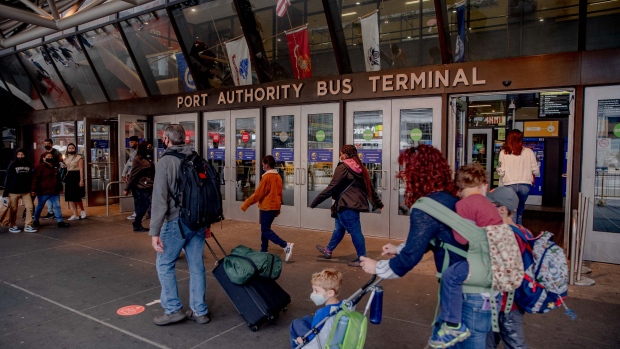Mar 22, 2023
New Jersey-to-NYC Commuters Face Disruption as Bus Route Set to End
, Bloomberg News

(Bloomberg) -- When DeCamp Bus Lines ends its New York City commuter service next month, the New Jersey-based company will join a slew of transit providers that have cut back or shuttered since the pandemic wiped out ridership.
Nearly half of private US bus companies have shut down since 2019, according to the American Bus Association, and more could close as work-from-home policies have altered commuting patterns and more people turn to driving amid the pandemic.
“There were about 3,000 bus companies in 2019, there’s closer to 1,500 or 1,600 bus companies left,” American Bus Association President and Chief Executive Officer Peter Pantuso said in an interview. “It’s possible we could lose more.”
DeCamp’s daily ridership has shriveled to maybe 1,300 or fewer on weekdays, from about 6,500 or more pre-pandemic, said Jonathan DeCamp, the sixth generation of his family to run the business.
The company is still running about 80 trips to and from New York City a day, he said. Now those riders must scramble to find alternatives.
Retail worker Joyelle Dempsey, 48, who has been taking the DeCamp bus for more than 20 years, is facing a more complicated commute. Her DeCamp bus stop is just a few blocks from her house in Belleville, New Jersey.
“What am I going to do? I was shocked, such an inconvenience now,” said Dempsey, who rides into Manhattan. “Now to get to the city I’m going to have to take either two buses or a bus and a train.”
‘Heart-wrenching’
Many transit services rely heavily on fares, and with that revenue having dwindled, operators have had to seek out other sources of funding. Unless the government steps in or new sources of money are found, many agencies may be left with two choices: cut service or raise fares. Neither of which help to bring riders back.
For DeCamp, which is based in the New Jersey suburb of Montclair, some 20 miles (32 kilometers) from Port Authority Bus Terminal in Manhattan, monthly ridership is stuck at about 20% of pre-pandemic levels for its routes to New York City.
“For it to be taken away basically because of Covid, it’s heart-wrenching,” Jonathan DeCamp said in a telephone interview. “I feel horrible.”
Founded in 1870, DeCamp had been able to sustain services thanks to federal and state aid. But now, without further assistance, “commuter services are too much to bear,” the company said in a notice posted to Twitter on Monday. Its last day of service for New Jersey to NYC routes is April 7. DeCamp will still offer its other services like charter buses.
Riders who relied on DeCamp must find alternatives like New Jersey Transit, the PATH train or even driving. NJ Transit said it will communicate the options for DeCamp customers before April 7.
“NJ TRANSIT is currently assessing the impacts of DeCamp’s decision to cease their limited post-pandemic commuter service,” New Jersey Transit spokesperson Jim Smith said in a statement. “Part of that assessment is identifying the alternatives already available on existing NJ TRANSIT bus, rail and light rail service.”
Read more: How the Pandemic Changed Our Commutes to the Office
Like all US transit systems, the region’s network is struggling to win back riders. New York’s Metropolitan Transportation Authority’s weekday subway ridership is about 67% of 2019 levels, and NJ Transit’s is about 75% system-wide.
Trans-Bridge Lines, a Pennsylvania-based private bus company that runs commuter routes from New Jersey to New York City, is operating at about 33% of its pre-pandemic levels, said Tom JeBran, president of the company. Before Covid, the company had 63 runs across all of its schedules. Now they run just 21.
“We fully understand the effects that COVID-19 had and is still having on our industry,” JeBran said in an interview. He added that Trans-Bridge Lines has no plans to stop commuter services and continues to monitor passenger counts and recruit motorcoach drivers.
Tough Economics
The latter is no easy task. Even with demand, providers industry-wide are struggling to find drivers, JeBran said.
“We continue to actively recruit and train candidates while simultaneously studying our ridership levels to ensure we are accommodating our passengers the best we can,” JeBran said.
The unfavorable economics of running a transit service right now aren’t helping. Fluctuating fuel costs and the lack of employees has made it hard to sustain these businesses, said Dan Rodriguez, president of the Bus Association of New Jersey.
At least one other bus line is stepping up service options. Academy Bus, based in Hoboken, New Jersey, is adding additional service on eight of its 17 routes between New Jersey and New York starting April 3. The company is seeing increased demand for its commuter bus service, according to a spokesperson.
US transit systems have had to adjust to the reality that ridership might not return to pre-Covid levels. S&P Global Ratings has said that US public-transportation systems will only recapture about 85% of their pre-pandemic ridership levels by 2026.
“Market vulnerability that led to this is not unique to DeCamp,” Zoe Baldwin, the Regional Plan Association’s New Jersey director, said in an interview.
In the case of Decamp, the fallout may be two-fold: people shift to driving and NJ Transit tries to make up for the service, she said.
©2023 Bloomberg L.P.






